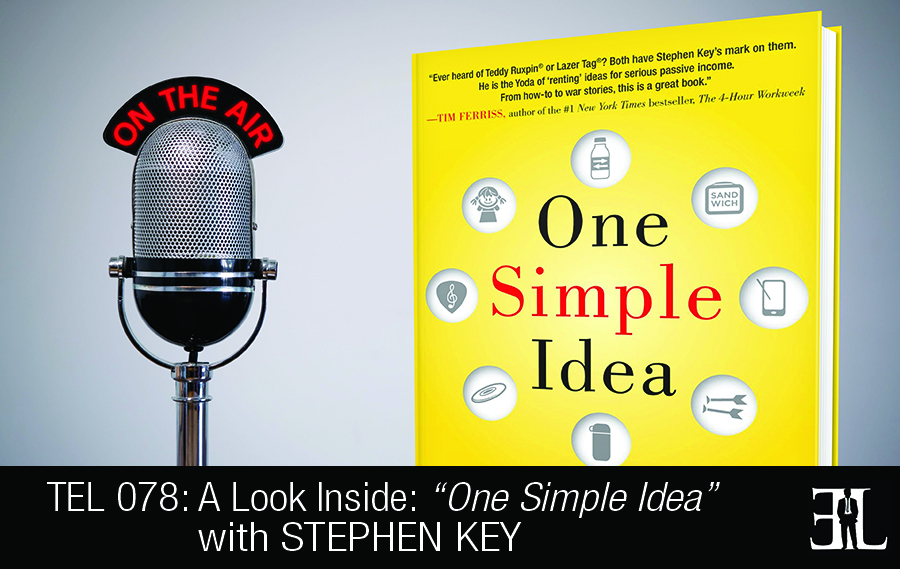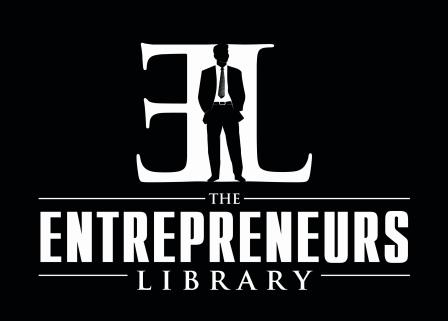A Preview of One Simple Idea with Stephen Key

A summary of things you should know about One Simple Idea according to Stephen Key
Introduction
In this episode Stephen Key shares his book One Simple Idea where he shows you how to come up with ideas and license them to companies.
In his book, Key provides you with a step-by-step guide into bringing your ideas to market while helping you understand the ins and outs of licensing ideas. The goal of the book is teach you how to keep your ideas safe, be your own boss, see your product go to market, and make big money without quitting your job.
This book is perfect for entrepreneurs who already love what they are doing, but have multiple ideas that could benefit other companies and provide themselves with smart passive income.
The Book’s Unique Quality
I think most entrepreneurs think that the only way to create an idea is to start a company and my book is really the exact opposite of starting a company. It’s about coming up with ideas and licensing those ideas to companies.
The Best Way To Engage
It’s written in such a way that you can get through it very, very fast and you can jump in and out if you want.
The Reader’s Takeaway
I want the reader to walk away knowing that they can do this!
A Deep Dive Into The Book
This book is about how you can take an idea and bring it to market through licensing. It sounds complicated but it’s not. You are going to show a company your idea and if they like it they will bring it to market for you and pay you a royalty on everyone they sell. It’s the best partnership you could possibly have because those companies who are looking for ideas need you and your ideas.
The benefits of licensing are that you can live anywhere in the world. But the point of licensing is that you don’t have to take risks, start a company and spend your hard earned money.
This book is broken up in eight parts. The first part talks about the benefits, open innovation and why companies need you.
Part two of my book talks about how to find that million dollar idea. This is about making small improvements on existing ideas. This takes away the risks and there are three games in the book that help you come up with these small improvements.
You don’t have to be creative to do this. You just need to understand the steps of licensing.
In part two of my book I talk about how to pick the ideas that are going to be truly profitable. Ideas that are profitable really solve a problem. You also want to figure out if there is a large market for your idea. You don’t want to work on an idea that has a small market because it’s just a waste of time and you won’t make any money. You also want to find an idea that can be manufactured. There is a process in the book about how you can contact a company and get quotes to make sure it can be manufactured that way you are eliminating the risks. Also, ideas that are winners are easy to demonstrate.
Some wonder if it’s necessary to build a prototype and I am here to tell you that you don’t have to do that. You can go and have someone create a 3d computer generated drawling of your idea and that’s all you really need.
In part five of the book I talk about creating a Sales sheet. It’s one page explaining what your idea is, a picture of your idea, the benefit of it and your contact information.
Part six is about protecting yourself. Everyone is fearful and thinks that the company is going to steal your idea and I talk about how to kick that fear to the curb. Companies need you so there is no reason for them to take your ideas.
In the book I also talk about how it’s not cold calling but rather finding a home for your idea. I tell you how to reach those companies and what to say.
The last part of the book I talk about every step you make to cut the deal.
Notable Quotes From The Book
“If you can dream it you can do it.” Walt Disney
The Credibility/Inspiration Of The Author
I am just a regular guy that wants to be creative. In college I wasn’t sure what I wanted to do so I ended up taking an art class and realized I wanted to be creative and sell my creativity. For the last 30 years I have been coming up with little ideas and show them to companies and if they like them they license those ideas from me.
I have been bringing my own ideas to market through licensing and I have been educating students for the last 12 years on this same process. So when McGraw Hill had contacted me to write a book I agreed because a lot of people just don’t understand what licensing is.
Other Books Recommended By The Author
Magic of Thinking Big by David Schwartz
More Information About This Book and The Author
Buy One Simple Idea by Stephen Key on Amazon today
Visit Licensing Lifestyle on Inc. to read more of Stephen’s content
Visit InventRight.com to learn more about Stephen’s company
More Information About This Episode
Listen on iTunes, Stitcher , and SoundCloud
Related books: Invent It, Sell It, Bank It! by Lori Greiner | The Independent Inventor’s Handbook by Louis Foreman | One Simple Idea for Startups and Entrepreneurs by Stephen Key
What did you like and not like about this episode? Fill out this one minute survey here.
 The Entrepreneurs Library
The Entrepreneurs Library














